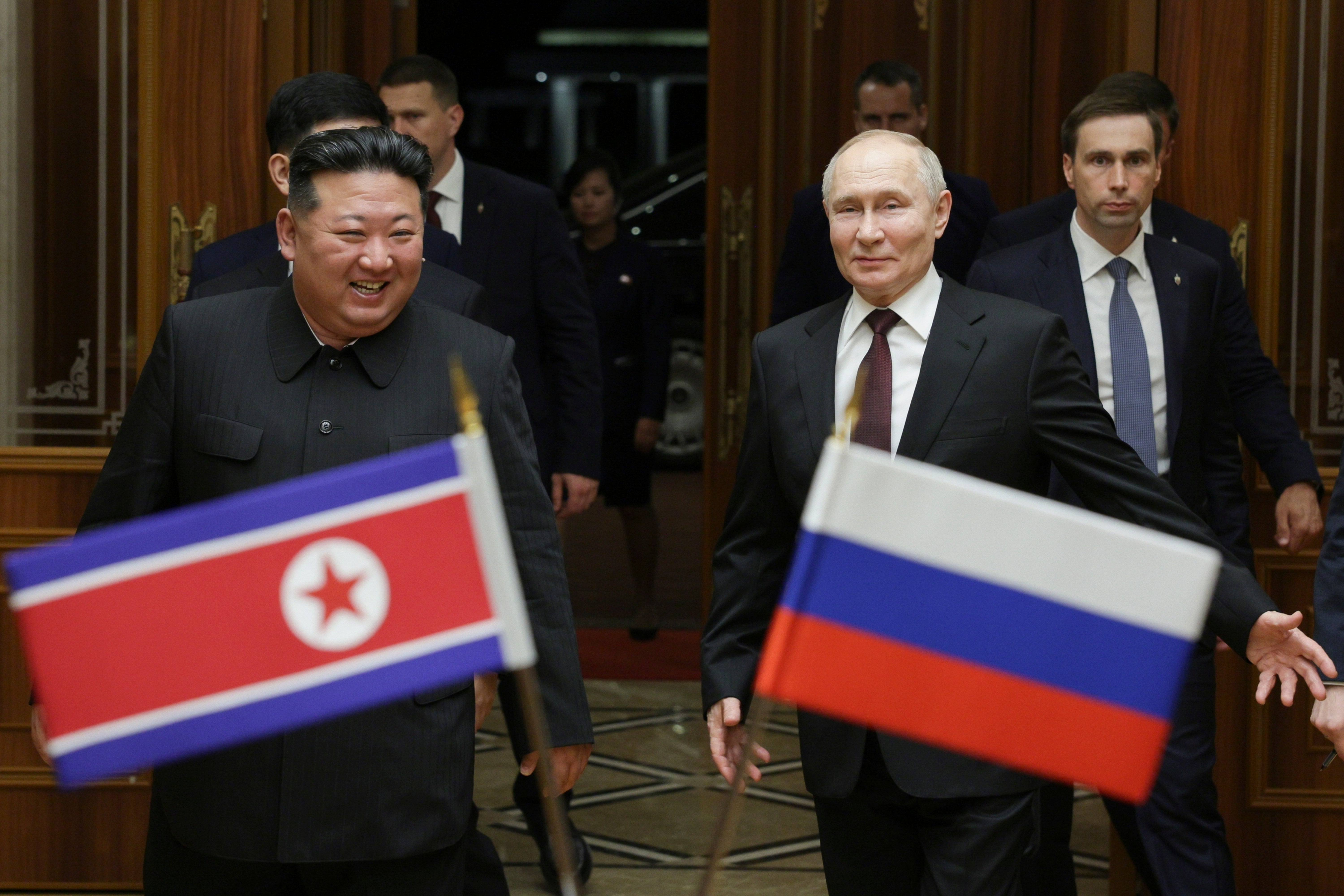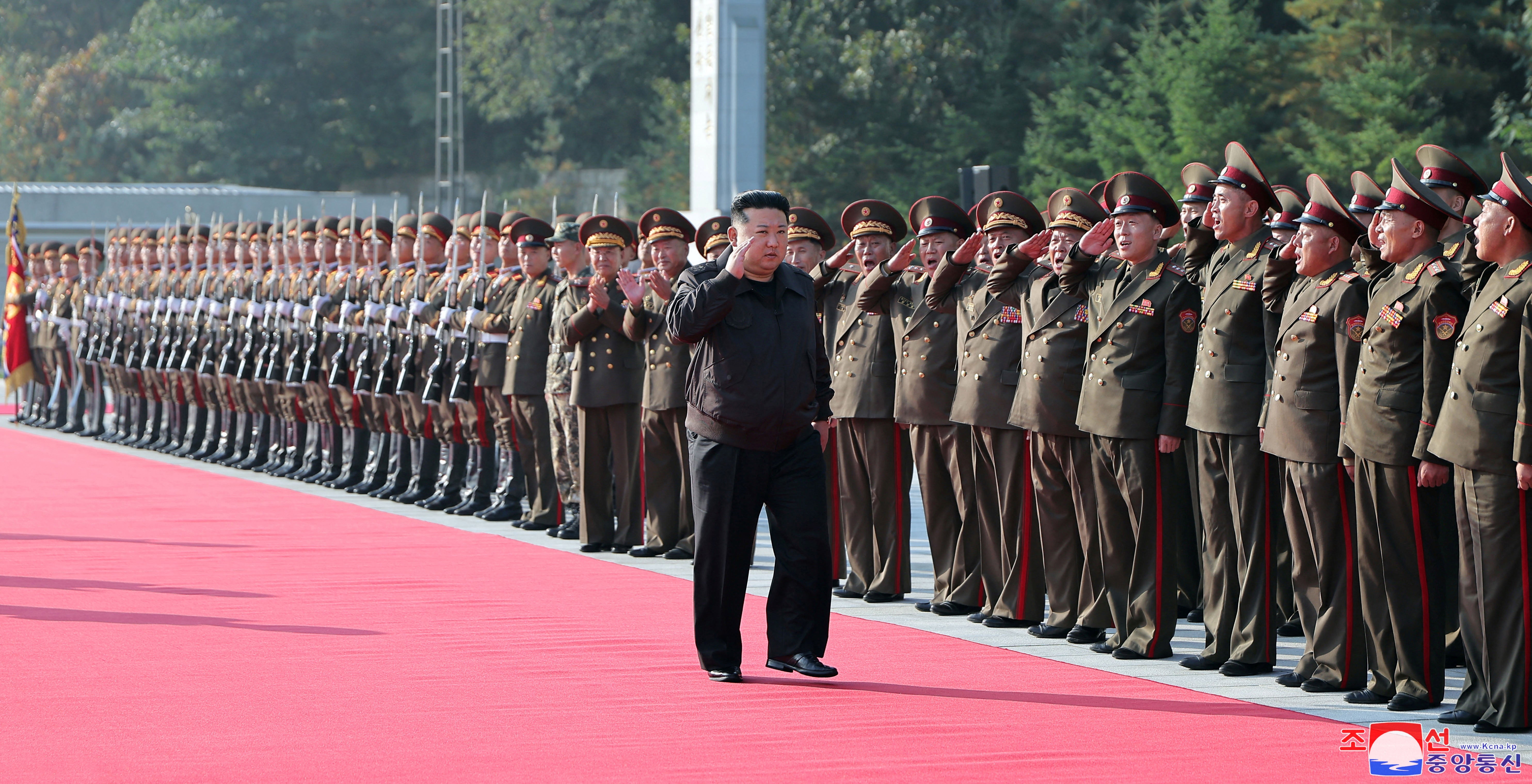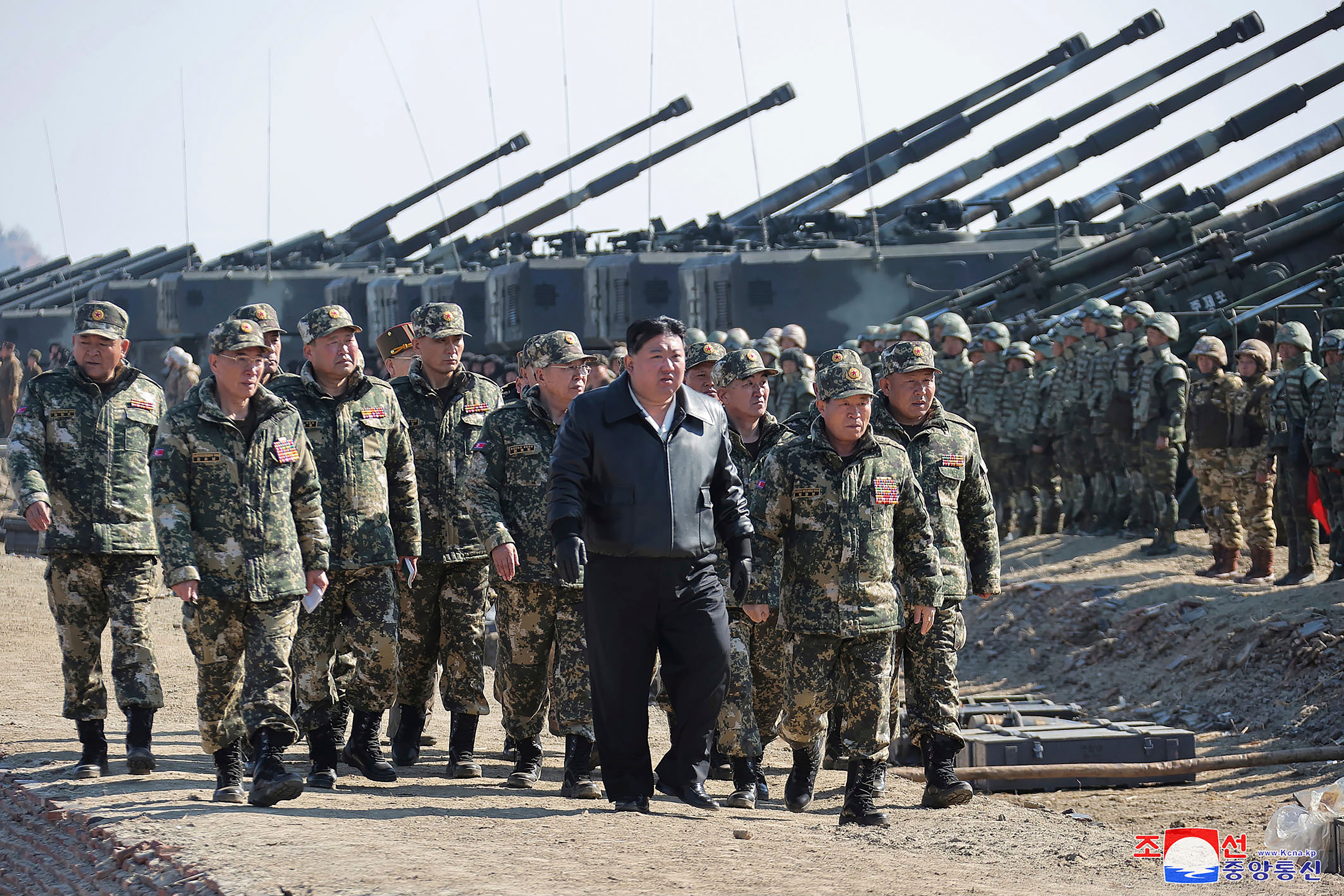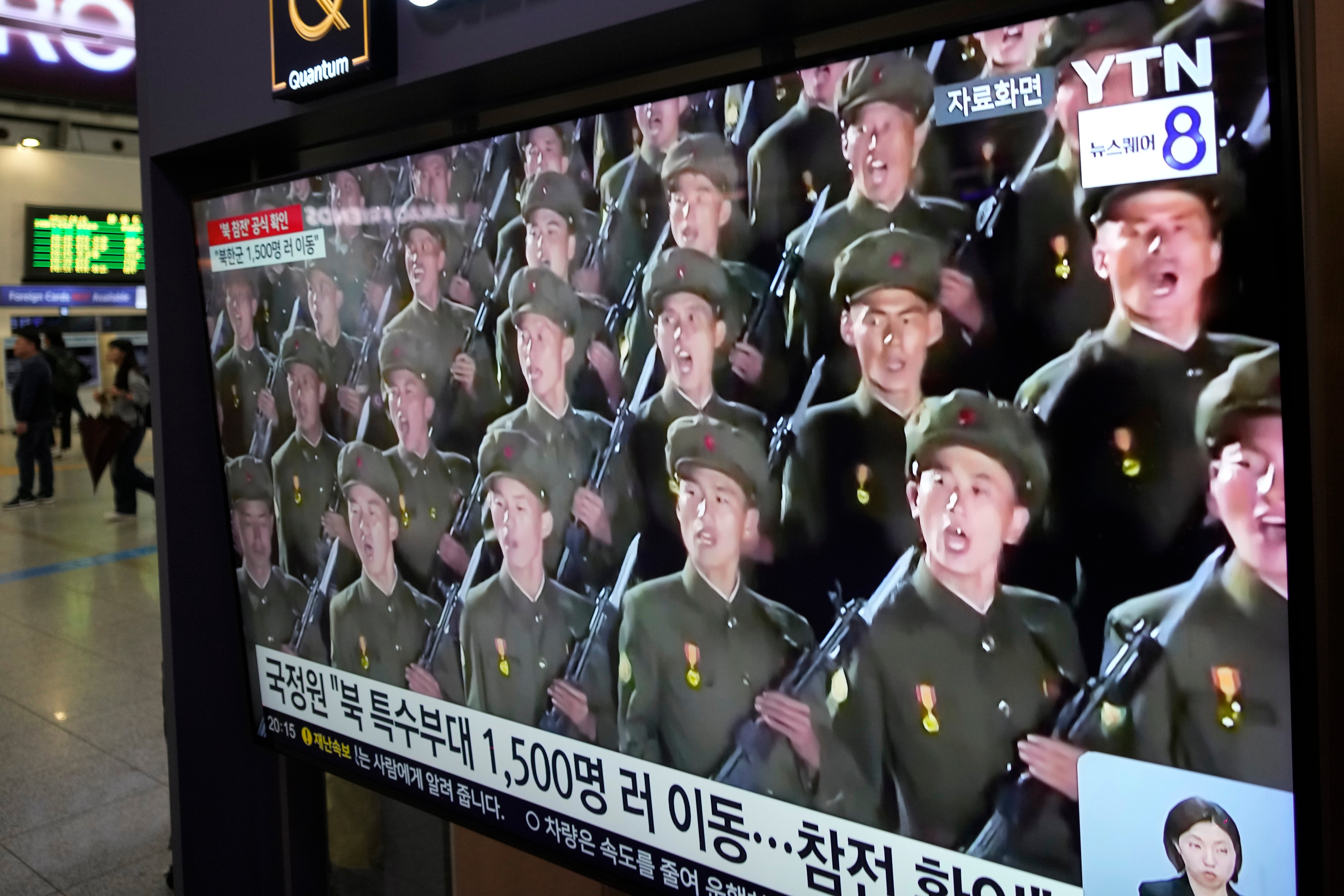Why are North Koreans troops in Ukraine? Everything we know about Kim Jong-un’s soldiers joining Putin’s war
US warns Pyongyang’s troops fighting inside Putin’s ‘meat grinder’ war would be legitimate targets
The first military personnel from North Korea in Russia's border region of Kursk have already come under fire from Ukraine amid concerns about Pyongyang sending thousands of soldiers to Vladimir Putin’s war for nuclear rewards.
The Pentagon last week said North Korea dispatched 10,000 troops to Russia, with some of them believed to be heading to Kursk to join Mr Putin’s forces in their invasion of Ukraine amid the biggest conflict Europe has seen since the Second World War. The Russian forces are facing difficulty in pushing back Ukraine’s cross-border incursion launched on 6 August.
"The first military personnel of the DPRK [Democratic People's Republic of Korea] have already come under fire in the Kursk region of the Russian Federation," said Ukrainian Center for Countering Disinformation head Andriy Kovalenko on Monday, referring to North Korea.
A UN spokesperson said secretary-general Antonio Guterres was "very concerned" about North Korean troops being sent to Russia and their "possible deployment to the conflict zone".
The spokesperson said "everything must be done to avoid any internationalisation of this conflict".
Ukraine’s estimates, higher than Washington’s, suggest that around 12,000 North Koreans are involved in fighting on behalf of Russia. Of these, more than 7,000 North Koreans with Russian gear and weapons are already in areas near Ukraine, Kyiv’s military intelligence agency said on Saturday.
An anxious Volodymyr Zelensky urged Ukraine’s allies to take steps to prevent the deployment of Pyongyang’s troops instead of just "watching" and "waiting”.
The Ukrainian president suggested a preemptive Ukrainian strike on camps where the North Korean troops are being trained, but said Kyiv won't be able to do so without the permission from Western allies.
Western leaders described the North Korean troop deployment as a significant escalation that could also jolt relations in the Indo-Pacific region, and open the door to technology transfers from Moscow to Pyongyang that could advance the threat posed by North Korea’s nuclear weapons and missile program.
South Korean defence minister Kim Yong Hyun and the EU’s visiting foreign policy chief, Josep Borrell, expressed “serious concerns” about the troop dispatch and “strongly condemned” the move on Monday.
Last week, Nato secretary general Mark Rutte confirmed the Ukrainian intelligence reports of the presence of North Korean military units in Kursk. The deployment of North Korean troops to Kursk is “also a sign of [president] Putin’s growing desperation,” he said.

Mr Putin has not denied North Korea’s involvement in the war, following the repeated rejection of reports by the Kremlin as “fake news”.
Pyongyang recently vowed to back Russia till it achieved victory over Ukraine. “Our traditional, historically friendly relations, which have traveled the tested path of history, today ... are rising to a new level of relations of invincible military comradeship,” the North’s foreign minister Choe Son Hui said during her trip to Moscow last week.
It came as US secretary of state Antony Blinken warned North Korean troops fighting inside the Russian president’s “meat grinder” war would be a legitimate military target.
Mr Zelensky said last month North Korean officers and technical personnel had been spotted in Russian-occupied territories but did not specify when. “I believe they sent officers first to assess the situation before deploying troops,” Mr Zelensky said last week, warning that the participation of a third country could escalate the conflict into a world war.
Ukraine published a video purportedly showing dozens of North Koreans lining up to collect Russian military fatigues after South Korea’s National Intelligence Service said Pyongyang had shipped 1,500 special forces troops to Russia's Far East for training. Ukrainian authorities said they “cannot provide additional verification from the sources who provided it to us due to security concerns”.
Ukraine and Russia have both received weapons from allies since Mr Putin invaded in February 2022, with Kyiv’s war effort increasingly reliant on money and arms from the West. But neither has yet been backed up by large deployments of troops from a third country.

What is the extent of North Korea's involvement?
The US believes at least 3,000 North Korean troops are undergoing training at three military bases in eastern Russia, White House spokesperson John Kirby said last month.
According to the White House, the US determined the North Korean soldiers were transported by ship in early-to-mid October from North Korea’s Wonsan region to the eastern Russian city of Vladivostok before being taken to three military training sites in eastern Russia, Mr Kirby said.
“If they do deploy to fight against Ukraine, they’re fair game,” he said. “They’re fair targets and the Ukrainian military will defend themselves against North Korean soldiers the same way they’re defending themselves against Russian soldiers.”
South Korea’s National Intelligence Service said Pyongyang has sent around 3,000 troops – including special forces – to Russia’s far east for military training and acclimatising at the bases there, in what could be readiness forcombat in the war.
The troops have been supplied with Russian military uniforms, weapons and false identification documents ahead of their deployment for combat, the NIS said.
North Korea is forging closer military ties with Russia just as it is severing relations with South Korea, prompting the US, Japan, South Korea and eight other Western governments to form a new multinational team to monitor the enforcement of sanctions against Pyongyang.
The US Department of the Treasury claimed in May that Moscow had used more than 40 ballistic missiles from North Korea in its attacks across Ukraine as well as other munitions in breach of UN Security Council resolutions.
Mr Putin and North Korean leader Kim Jong-un reportedly signed a mutual aid agreement in June to facilitate the transfer of ammunition and missiles for Moscow’s war effort.
The US State Department said there were signs that North Korea was increasing its supply of weapons like artillery shells and missiles to Russia which was “creating further instability in Europe".
Are North Koreans already fighting for Russia?
Ukrainian media reported this month that six North Korean soldiers had been killed in a missile strike in eastern Donetsk on 3 October. The reports have not been confirmed.
“The issue of deploying regular troops is highly likely due to the mutual agreements that resemble a military alliance” between Pyongyang and Moscow, South Korean defence minister Kim Yong-Hyun said earlier this month.
South Korea’s spy agency said it used AI facial recognition technology to identify a delegation of dozens of North Korean officers visiting frontline areas in Ukraine to instruct Russian soldiers how to operate KN-23 ballistic missiles allegedly supplied by Pyongyang.
It also claimed vessels of Russia's Pacific Fleet were detected moving the North Korean special forces troops to Vladivostok from 8 to 13 October.
A North Korean troop deployment, if confirmed, would bolster the fast-diminishing ranks of the Russian military. Neither side makes casualty figures public, but the New York Times reported Russia had seen at least 115,000 soldiers killed and 500,000 wounded since the start of the war over two years ago.
The Wall Street Journal, citing unnamed sources, reported last month that about one million Ukrainians and Russians had been killed or wounded since the war began.
There have been reports in the past that North Korea sent civilian workers to help with reconstruction efforts in occupied Ukrainian regions captured by Russia after the war started in February 2022.

How does sending troops to Ukraine benefit Pyongyang?
North Korea’s strategic partnership with Moscow has deepened significantly since Mr Kim travelled to Russia for a rare foreign visit last year.
Mr Putin then visited the North this year and the two leaders signed a defence pact that called for mutual assistance “using all available means” in the event of aggression against either country.
The North would receive Russian funds for sending troops to the Ukrainian frontline, money which Pyongyang needs to build its nuclear force, said Andrei Lankov, director of a security analysis firm Korea Risk Group.
“Pyongyang would be paid well and maybe get access to Russian military technology, which otherwise Moscow would have been reluctant to transfer to North Korea,” Mr Lankov told the BBC.
“It would also give their soldiers real combat experience, but there is also the risk of exposing North Koreans to life in the West, which is a considerably more prosperous place.”
US National Security Council spokesperson Sean Savett said that any North Korean involvement in the war would represent a significant increase in its defence ties with Russia.
“It also indicates a new level of desperation for Russia as it continues to suffer significant casualties on the battlefield in its brutal war against Ukraine,” he was quoted as saying by The Guardian.
In a show of support, Russia in March vetoed a UN resolution that effectively abolished monitoring by UN experts of Security Council sanctions against North Korea. It prompted Western accusations that Moscow was acting to shield its arms purchases from Pyongyang to fuel its war in Ukraine.
North Korea has shipped about 7,000 containers filled with munitions to Russia since last year and in return for 9,000 Russian containers likely filled with aid, South Korea has claimed.
Aiding Russia can also backfire on Pyongyang as North Korea has been under UN Security Council sanctions since 2006 and the measures have been steadily strengthened over the years with the aim of halting Pyongyang’s development of nuclear weapons and ballistic missiles.
The Security Council has a North Korea sanctions committee – made up of the 15 council members, including Russia – to “examine and take appropriate action on information regarding alleged violations.” It operates by consensus and can designate individuals and entities.
A Security Council member could also propose action through the adoption of a resolution, but that would require at least nine votes in favour and no vetoes by Russia, China, the United States, France or Britain.

How are the US and its allies responding?
If North Korea’s participation in Russian invasion of Ukraine is confirmed, the US hinted there will be no limits on the use of its weapons given to Kyiv.
"If we see DPRK troops moving in towards the front lines, they are co-belligerents in the war," Ms Singh said, using the acronym for the Democratic People's Republic of Korea, or North Korea. "This is a calculation that North Korea has to make."
It is not immediately clear how or when Nato allies might respond to the North Korean involvement. They could likely lift restrictions that prevent Ukraine from using Western-supplied weapons for long-range strikes on Russian soil.
German and British officials also weighed in last week with South Korea hinting that it could support Ukraine with military weapons in the event of North Korea’s confirmed involvement.
“We don’t even know whether we are talking about 1,500 or 12,000, or which kind of soldiers are coming to Russia and to fight where and against,” German defence minister Boris Pistorius said. “It’s a kind of escalation and it shows us a very important, a very important aspect. International conflicts are approaching very rapidly.”
British defence secretary John Healey said there was “not just a concern about the potential for an escalation of conflict in Europe. There is an indivisible link with security concerns in the Indo-Pacific as well.”
Earlier this week, South Korea’s foreign ministry summoned the Russian ambassador in Seoul to register its protest and demand the immediate withdrawal of alleged North Korean troops from Ukraine.
Kim Hong-kyun, the South’s first vice foreign minister, said the participation of North Korean troops in the war in Ukraine violated UN resolutions and the UN charter and posed serious threats to the security of South Korea.
“We condemn North Korea’s illegal military cooperation, including its dispatch of troops to Russia, in the strongest terms,” the ministry quoted Mr Kim as saying.
The US, Japan and South Korea have separately issued a joint statement condemning North Korea for its nuclear and missile developments, deepening military cooperation with Russia and engaging in allegedly illegal activities to fund its weapons programmes. The statement also highlighted Washington’s “ironclad” commitment to defend its allies.
Join our commenting forum
Join thought-provoking conversations, follow other Independent readers and see their replies
Comments


Bookmark popover
Removed from bookmarks